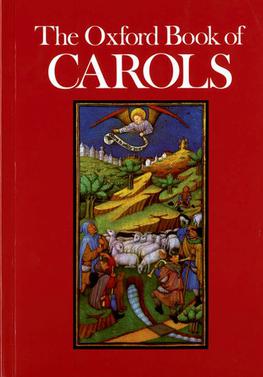The Oxford Book of Carols
The Oxford Book of Carols is a collection of vocal scores of Christmas carols and carols of other seasons, published by Oxford University Press. It was first published in 1928, edited by Percy Dearmer, Martin Shaw, and Ralph Vaughan Williams. The collection has had a significant impact on the revival and popularization of carol singing in the English-speaking world and remains a cornerstone in the study and performance of carols globally.
History[edit | edit source]
The origins of The Oxford Book of Carols lie in the early 20th century, a period that saw a resurgence of interest in traditional English music and folklore. This was part of a wider movement that sought to recover and preserve the nation's cultural heritage, which many felt was being lost amidst rapid industrialization and urbanization. Percy Dearmer, a priest and scholar, Martin Shaw, a composer, and Ralph Vaughan Williams, a composer and musicologist, collaborated to compile a comprehensive collection of carols that would reflect the rich tradition of Christmas and seasonal music from the United Kingdom and beyond.
Content[edit | edit source]
The Oxford Book of Carols includes a wide variety of carols, ranging from traditional Christmas tunes known worldwide to lesser-known songs from various cultures and periods. The collection is notable for its inclusion of both sacred and secular texts, providing a broad spectrum of themes and musical styles. Each carol is presented with its vocal score, allowing for performance by choirs of various sizes and compositions. The editors also provided detailed notes on the origin and history of each carol, offering readers and performers insight into the context and significance of the songs.
Impact[edit | edit source]
Since its publication, The Oxford Book of Carols has been widely regarded as one of the most important and influential collections of carols available. It has contributed significantly to the revival of carol singing in churches, communities, and homes, particularly in the United Kingdom and the United States. The book has also served as a valuable resource for scholars and musicians studying the history and evolution of carols and Christmas music. Its influence extends beyond the academic and musical communities, as it has played a role in shaping the modern traditions of Christmas celebrations.
Editions[edit | edit source]
Over the years, The Oxford Book of Carols has seen several editions and revisions, reflecting ongoing research and discoveries in the field of musicology. These updates have included the addition of new carols, updated musical arrangements, and revised historical notes, ensuring that the collection remains relevant and useful for contemporary audiences.
Legacy[edit | edit source]
The legacy of The Oxford Book of Carols is evident in its enduring popularity and the continued vitality of carol singing traditions around the world. It has inspired numerous other collections and performances, contributing to the preservation and dissemination of carol traditions across generations. The book is not only a testament to the rich heritage of carol singing but also a living document that continues to evolve and inspire new interpretations and celebrations of seasonal music.
Search WikiMD
Ad.Tired of being Overweight? Try W8MD's physician weight loss program.
Semaglutide (Ozempic / Wegovy and Tirzepatide (Mounjaro / Zepbound) available.
Advertise on WikiMD
|
WikiMD's Wellness Encyclopedia |
| Let Food Be Thy Medicine Medicine Thy Food - Hippocrates |
Translate this page: - East Asian
中文,
日本,
한국어,
South Asian
हिन्दी,
தமிழ்,
తెలుగు,
Urdu,
ಕನ್ನಡ,
Southeast Asian
Indonesian,
Vietnamese,
Thai,
မြန်မာဘာသာ,
বাংলা
European
español,
Deutsch,
français,
Greek,
português do Brasil,
polski,
română,
русский,
Nederlands,
norsk,
svenska,
suomi,
Italian
Middle Eastern & African
عربى,
Turkish,
Persian,
Hebrew,
Afrikaans,
isiZulu,
Kiswahili,
Other
Bulgarian,
Hungarian,
Czech,
Swedish,
മലയാളം,
मराठी,
ਪੰਜਾਬੀ,
ગુજરાતી,
Portuguese,
Ukrainian
Medical Disclaimer: WikiMD is not a substitute for professional medical advice. The information on WikiMD is provided as an information resource only, may be incorrect, outdated or misleading, and is not to be used or relied on for any diagnostic or treatment purposes. Please consult your health care provider before making any healthcare decisions or for guidance about a specific medical condition. WikiMD expressly disclaims responsibility, and shall have no liability, for any damages, loss, injury, or liability whatsoever suffered as a result of your reliance on the information contained in this site. By visiting this site you agree to the foregoing terms and conditions, which may from time to time be changed or supplemented by WikiMD. If you do not agree to the foregoing terms and conditions, you should not enter or use this site. See full disclaimer.
Credits:Most images are courtesy of Wikimedia commons, and templates, categories Wikipedia, licensed under CC BY SA or similar.
Contributors: Prab R. Tumpati, MD

